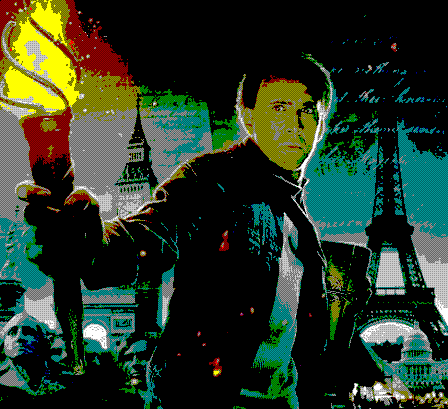"... if thou bring thy gift
to the altar, and
there rememberest...."
Matthew 5:23-24
The following meditations were inspired by an ad today in the online New York Times obituaries section--
"Been somewhere interesting? Tell us about it for a chance to win a trip for 2 to Paris."
Country song, quoted here Dec. 17, 2003--
"Give faith a fighting chance."
Malcolm Lowry, Under the Volcano--
"I sit now in a little room off the bar at four-thirty in
the morning drinking ochas and then mescal and writing
this on some Bella Vista notepaper I filched the other
night.... But this is worst of all, to feel your soul
dying. I wonder if it is because to-night my soul has
really died that I feel at the moment something like
peace. Or is it because right through
hell there is a path, as Blake well knew,
and though I may not take it, sometimes lately in dreams
I have been able to see it? ...And this is how I
sometimes think of myself, as a great explorer who has
discovered some extraordinary land from which he can
never return to give his knowledge to the world: but the
name of this land is hell. It is not Mexico of course but
in the heart."
From an obituary of mathematician Gian-Carlo Rota linked to here on April 18, the anniversary of Rota's death:

Gian-Carlo Rota
"He always brought a very fresh
perspective on philosophical
issues."
April 21, 2008:
Odd Couples
Click image to enlarge.
From a novel, Psychoshop, quoted here in an entry on the Pope's birthday, "The Gates of Hell" --
His manner was all charm and grace; pure cafe society....
He purred a chuckle. "My place. If you want to come, I'll show you."
"Love to. The Luogo Nero? The Black Place?"
"That's what the locals call it. It's really Buoco Nero, the Black Hole."
"Like the Black Hole of Calcutta?"
"No. Black Hole as in astronomy. Corpse of a dead star, but also channel between this universe and its next-door neighbor."
"Here? In Rome?"
"Sure. They drift around in space until they run out of gas and come to a stop. This number happened to park here."







Recent Comments